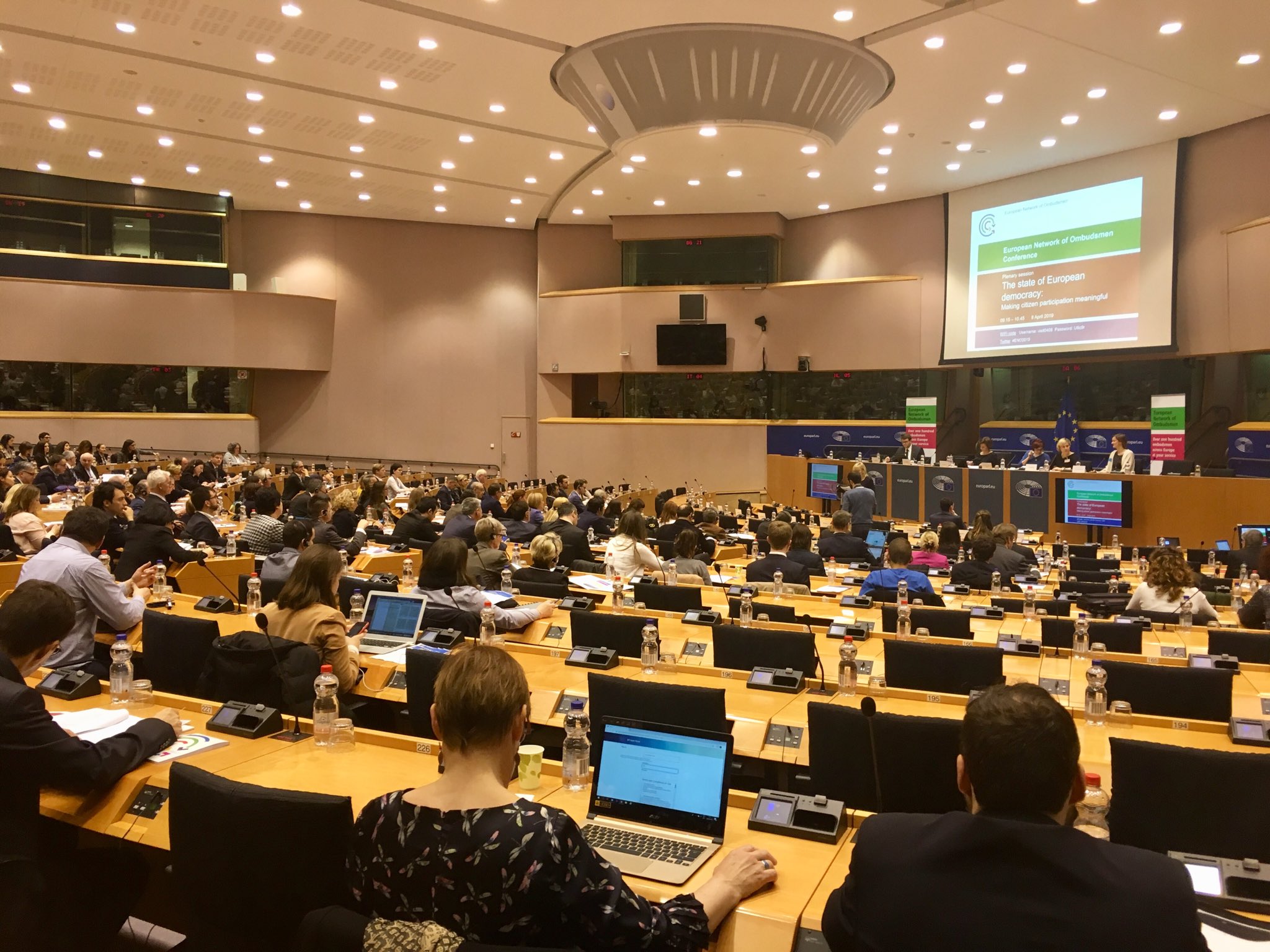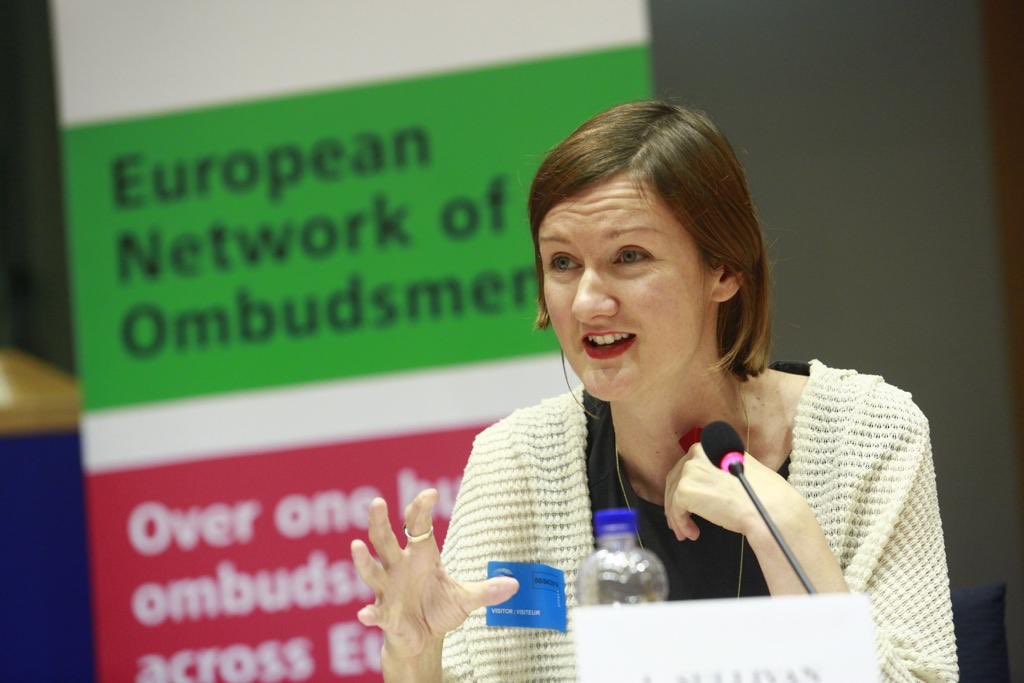
European Network of Ombudsmen
European democracy: making citizen participation meaningful

On the eve of the European elections, the main public session of the ENO conference discussed the state of democracy in Europe, and how to make citizens feel their voice counts.
European Ombudsman Emily O’Reilly opened the debate by exploring the wider political context, including the rise of populism and the normalisation of rhetoric and behaviour previously considered unacceptable. This has implications for the work of ombudsmen, whose task of ensuring that administrations are upholding fundamental values is more difficult when these values are no longer seen as universal.

 Gundi Gadesmann
Gundi Gadesmann
.@EUombudsman O’Reilly opens conference on citizens’ participation, calling on national ombudsmen colleagues to help protect democracy #ENO2019
European Ombudsman Emily O’Reilly gives the opening address at the ENO 2019 conference and calls on her ombudsman colleagues to help protect democracy.


Ms O’Reilly cautioned against dismissing the current populist trend as a product of either racism or political careerism. She noted that the trend has typically emerged in response to issues such as economic instability, cultural change, inequality and the fear of technological disruption to traditional jobs.
In the UK, as in many other countries in Europe, there is a large number of citizens who feel they are not being heard.
The EU’s Chief Negotiator for Brexit, Michel Barnier, also spoke about addressing the issues that lead voters to support populist causes, like Brexit. In the UK, as in many other countries in Europe, there is a large number of citizens who feel they are not being heard. They feel that the EU is having an ever-greater effect on their lives, but they do not understand how it works and believe it does not always protect them from the impacts of globalisation.
He explained that he and the other EU negotiators had been conscious of the need to ensure the Brexit negotiations were as conducive to participatory democracy as possible. Three principles guided their work to this end: transparency (including making public as many documents as possible), cooperation (with all key decision-makers, notably Member State governments and the European Parliament throughout process) and consultation (with business representatives, think tanks, civil society and other interest groups). However, he stressed that more needs to be done to ensure that citizens feel adequately informed.
Spanish MEP Maite Pagazaurtundúa Ruiz argued that there is a gap between the theory and the practice of being an EU citizen, with problems in areas such as cross-border voting rights or freedom of movement. The European Parliament’s Constitutional Affairs Committee works to improve transparency at EU level, as well as promoting measures to improve direct and indirect democracy.
Much of the debate focused on the need to avoid making superficial gestures that purport to involve citizens more in decision-making, but fail to really do so. Ülle Madise, Estonian Chancellor of Justice, said citizens must have the feeling they are being listened to. Marian Wendt, chair of the petitions committee in the Bundestag, talked about the dilemma of engaging with private online petitions platforms, and the risk that these platforms create false expectations.

 Antonia Fiordelisi
Antonia Fiordelisi
Abbattere le frontiere tra #Istituzioni e #cittadini per garantirne la piena inclusione sociale #ENO2019 @EUombudsman
We need to break down the barriers between public institutions and citizens to improve social inclusion.


Building on the theme of false expectations, Laura Sullivan from citizens’ movement WeMove, argued that the European Citizens’ Initiative risked falling into this category. Despite being in place since 2012, no initiatives have led to the level of change asked for. She drew attention to research showing that when people are involved in public or citizens’ assemblies to discuss policy issues, they become more interested in politics. The EU should draw lessons from this, and the European Parliament should consider holding meaningful citizens’ assemblies.
The debate stressed the importance of communicating to the public in a language ordinary people can understand, such as using people’s real life stories, and clear and inclusive language.
Participatory democracy at EU level

The European Citizens Initiative (ECI) is one of the key innovations in participatory democracy at EU level in recent years. In theory, it enables a group of citizens to place an issue on the EU’s legislative agenda. Although the ECI has great potential, it has not so far delivered on this potential.
Of the four ECIs that managed to gather the one million signatures required for the European Commission to respond, none has resulted in legislative proposals directly along the lines petitioned for. This is not to say that the ECIs have led to no change. The momentum created by the ECI calling for the EU to ban the pesticide glyphosate has led to positive developments. Ultimately, however, glyphosate remains on the market in the EU. For some of the other ECIs, the supposed legislative response seemed to be initiatives that were already in the pipeline.
There is no obligation on the Commission to respond to ECIs by proposing the precise measures they demand. However, after the enormous effort that is made to organise an ECI, there is a risk of disengagement if there is a consistent lack of concrete action in response. We could get more cynicism and apathy instead of initiative and engagement. Some real political will could turn this around. For now, however, there is little debate on the ECIs at national level. This would be the right place to start.
The referendum on Brexit in the UK has led to debate over representative democracy versus direct democracy. However, it does not need to be an either or.
Beyond the ECI, there are other ideas that give grounds for hope on rejuvenating democracy in Europe. The referendum on Brexit in the UK has led to debate over representative democracy versus direct democracy. However, it does not need to be an either or. Referenda are problematic when taken alone, because of the lack of societal debate that precede them. It is questionable how much a leaflet can really clarify the merits and drawbacks of leaving or remaining in the EU after decades of membership.
Set against this, the ‘citizens’ assembly’, which preceded the recent referendum on abortion in Ireland, is an experiment worth analysing. Over five weekends, 99 members of the public from very different backgrounds listened to evidence presented by academics, doctors, lawyers, NGOs, the church, women who had to go to the UK to have an abortion and many others.
With the support of facilitators, the assembly deliberated and made a decision that was put forward as a recommendation to the Irish government. What is different is that people got a chance to listen, to reflect, to debate and to change their minds, or not. The assembly ultimately voted overwhelmingly in favour of changing the Irish constitution to allow for abortion. This assembly had a major impact on the debate and the referendum, which endorsed the change. This experience shows that deliberative democracy can run alongside other forms of democracy and reinforce them.
There have been very few experiments of this kind at the wider EU level. What if a citizens’ assembly were seen as a tool that could help EU legislators to find more common ground and compromise? What if a citizens’ assembly allowed people from all over Europe to deliberate on the Common Agricultural Policy? Could this deliberation help to challenge the accusation – fair or otherwise - that the reform processes to date have been dominated by special interests?
The real question is this: where can a real debate happen in Europe? Where is the place for people to listen, reflect, debate, understand, propose, clarify, dig deeper, disagree, reason with each other?

 European Ombudsman
European Ombudsman
‘The less we engage, the more things fall apart’, says @laura_sullivan @wemoveEU #ENO2019
The less people engage in shaping the democracy they live in, the more society as a whole is damaged, says Laura Sullivan, Executive Director of WeMove.EU


Finally, what about the European elections? If engagement in Europe were to be measured by turnout at elections, we should be worried. From 1979 to 2014, turnout fell from an average of 62% to 43%. At the last election, only 37% of Dutch people voted and 13% in Slovakia. The lower turnout goes, the more extremists tend to gain ground.
With this in mind, WeMove is working on a huge campaign to encourage people to vote, appealing to people to vote for leaders who make us want to call ourselves European: for climate champions, rights advocates and those who want to walk the talk on the original values of the EU. Meanwhile, all is eerily quiet at the national level. Where is the debate about these elections and what they mean or could mean? As Joni Mitchell sang ‘You don’t know what you’ve got till it’s gone’. It is time for us all to wake up.
Participatory democracy and the roles of petitions committees and ombudsmen

There are diverging ideas about what participatory democracy exactly is, what the different tools are, and how democratic institutions should react. There is also a distinction between the roles of petitions committees and ombudsmen, which shapes how they can and should respond to initiatives from mobilised citizens. The working group, which brought together representatives from ombudsman offices and petitions committees in the ENO, explored the different roles of each in the context of the overall responsibilities of democratic institutions with regard to participatory democracy.
By their nature, petitions committees serve as a direct interface between politics and participatory democracy. They provide an official public platform for citizens to mobilise and seek a response from political decision-makers to an issue.
Mobilised citizens who support petitions rely on parliaments to respond to the issues they have raised. While this can bridge the gap between politics and the public, it can also lead to frustration. Petitions committees can be criticised for not responding sufficiently to a petition, or for lacking transparency in how they respond to all petitions. Petitions committees across Europe have different approaches to their work.
How petitions committees respond to the modern trend for online activism is also a challenge. According to the chair, only around half of the petitions committees in Europe have comprehensive online systems for registering and submitting petitions. A further question the working group considered was how to respond to the private actors that are now involved in online activism and petitions. Most participants agreed that there is a need to respond to these platforms (like change.org) somehow.
There is a risk of even greater public disillusionment if there is no proper response.
The working group also considered whether the lack of mobilisation on issues implies that citizens are satisfied. This is not necessarily so, since there are other factors explaining why citizens do not mobilise, such as disillusionment or the lack of appropriate tools.
Participatory democracy cannot be top-down. The current approach often entails politicians and democratic institutions seeking to control and centralise citizen participation, and to regulate the terms of participatory democracy. In the present climate of disillusionment with politicians and public institutions, this cannot work. There needs to be a shift of mindset towards a bottom-up approach, with democratic and political institutions embracing a different set of tools.
Where citizens mobilise and try to engage in the democratic process, democratic institutions need to find a way to respond. There is a risk of even greater public disillusionment if there is no proper response. Clearly, ombudsman institutions and petitions committees have important roles to play here. Ombudsman institutions are independent, and can and should play a role in raising with decision-makers and legislators systemic issues that are brought to their attention.
The working group discussed how to determine what a ‘proper response’ is. Some citizens’ initiatives have very precise policy or legislative demands, whereas others do not. Democratic institutions do not necessarily need to implement precisely the demands of petitions or similar tools for the response to be considered legitimate and sufficient. If an issue raised by citizens is put on the political agenda, this is often a positive result in itself. It is then the role of democratic institutions to find the appropriate solution to this issue.